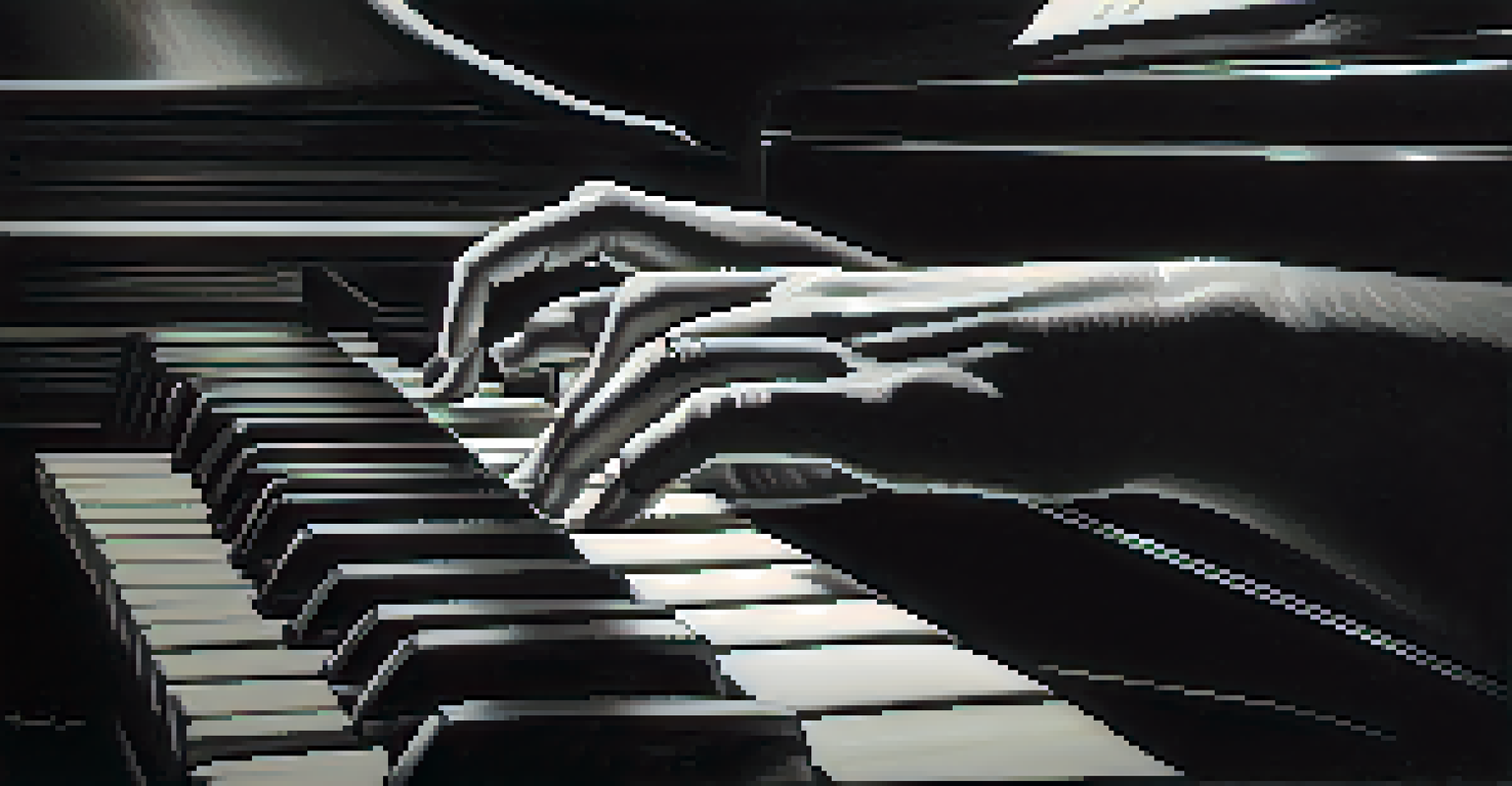Memorable Movie Themes: Composing for Cinema's Greatest Hits

The Power of Music in Film: Setting the Scene
Music plays a pivotal role in film, acting as a powerful tool to evoke emotions and enhance storytelling. Just think about how a suspenseful score can make your heart race during a thriller or how a romantic melody can bring tears to your eyes. The right composition not only complements the visuals but also amplifies the audience's experience, drawing them deeper into the narrative.
Music can change the world because it can change people.
Consider the unforgettable theme from 'Star Wars.' The iconic orchestration immediately transports viewers to a galaxy far, far away, setting the stage for an epic adventure. Such themes do more than just accompany scenes; they create a mood and establish an emotional connection that resonates long after the credits roll.
In essence, music in film is like a guiding hand, leading the audience through the emotional landscape of the story. Composers wield this tool with creativity and intention, crafting soundscapes that linger in our minds, making us feel and remember.
Iconic Themes: What Makes Them Stand Out?
When we think of iconic movie themes, certain melodies instantly pop into our minds. These compositions are often characterized by their catchy hooks, memorable motifs, and emotional depth. For instance, the haunting theme of 'Jaws' is simple yet effective, perfectly capturing the tension and fear associated with the unseen threat lurking beneath the waves.

But what truly sets these themes apart is their ability to encapsulate the essence of the film. The theme from 'The Godfather,' with its rich orchestration, conveys a sense of family, loyalty, and the complex nature of power. These themes become synonymous with their respective films, making them unforgettable parts of cinematic history.
Music Enhances Film Emotion
Music plays a crucial role in evoking emotions and deepening the audience's connection to the story.
Ultimately, an iconic theme resonates with audiences because it evokes specific emotions and memories. These compositions become embedded in our cultural landscape, often being referenced or parodied in various forms of media, further solidifying their status.
The Role of the Composer: Crafting a Film's Identity
At the heart of every memorable movie theme is a talented composer who breathes life into the film's narrative. Composers like John Williams and Hans Zimmer have become household names, known for their ability to create music that not only supports the story but also becomes a character in its own right. Their unique styles and innovative approaches have shaped modern cinema, demonstrating the power of a well-crafted score.
The music is the framework of the film. It’s the emotional spine of the film.
Take Williams, for example; his work on 'Harry Potter' features whimsical melodies that perfectly encapsulate the magical world of Hogwarts. Each note and rhythm is carefully constructed to evoke wonder and excitement, guiding viewers through Harry's journey. The composer’s understanding of the film's themes and characters is crucial in crafting a score that resonates.
Moreover, the collaboration between directors and composers is a vital part of the filmmaking process. This partnership ensures that the music aligns with the film’s vision, allowing for a cohesive storytelling approach that enhances the audience’s immersion.
From Silence to Sound: The Evolution of Film Scores
The journey of film scores has evolved remarkably since the silent film era, where live musicians accompanied screenings to evoke emotions. As cinema progressed, so did the complexity of soundtracks, leading to the rich orchestral scores we hear today. This evolution reflects advancements in technology and changes in audience expectations, with music becoming an integral part of the cinematic experience.
In the early days, filmmakers relied on piano or small orchestras to provide a live score, which meant music was often improvised to match the action on screen. However, with the advent of sound films, composers could create more intricate and thematic compositions, allowing for a deeper emotional connection with audiences. The introduction of recorded sound opened up new possibilities, paving the way for the blockbuster scores we now associate with major films.
Iconic Themes Shape Film Identity
Memorable themes encapsulate the essence of their films, creating lasting emotional connections with audiences.
Today, composers have access to a vast array of tools and technologies, enabling them to experiment with sound in ways that were once unimaginable. This evolution has not only changed how music is created but has also redefined our expectations of what a film score can achieve.
Case Study: The Impact of a Great Theme
Consider the impact of the 'Titanic' theme, composed by James Horner. The song 'My Heart Will Go On' became a global phenomenon, not just for its beautiful melody but also for its emotional resonance with the film's tragic love story. This theme elevated the movie, making it synonymous with themes of love and loss, and contributing significantly to its box office success.
Themes like this often transcend the film itself, becoming part of popular culture. They are played at weddings, featured in commercials, and covered by countless artists, highlighting how deeply they resonate with audiences. The ability of a theme to evoke nostalgia or emotion can turn it into a cultural touchstone that continues to be celebrated long after a film's release.
This impact demonstrates the power of a great theme in shaping not only a film's legacy but also the emotional landscape of its audience. When a theme strikes a chord, it can create a lasting connection that keeps people returning to the film time and again.
The Future of Film Composition: Trends and Innovations
As we look to the future of film composition, several trends are emerging that promise to reshape the landscape. One notable trend is the integration of technology, with composers increasingly utilizing digital tools and software to create innovative sounds and effects. This shift allows for greater experimentation and has led to unique soundscapes that can enhance the storytelling experience.
Another exciting development is the rise of collaboration between composers and other artists, such as pop musicians and electronic music producers. This fusion of genres can lead to fresh and contemporary scores that resonate with modern audiences. Films like 'Black Panther' have showcased how diverse musical influences can create powerful and memorable themes that reflect today’s cultural landscape.
Future Trends in Film Composition
The integration of technology and diverse musical influences is reshaping the landscape of film scores.
Moreover, as streaming platforms continue to gain prominence, we can expect to see more diverse storytelling reflected in film scores. This opens the door for a wider variety of musical styles and influences, enriching the cinematic experience and broadening the scope of what constitutes a film score.
Conclusion: Celebrating the Art of Film Music
In conclusion, the art of composing for cinema is a vital aspect of storytelling that deserves recognition. Memorable movie themes not only enhance the emotional depth of films but also connect with audiences on a personal level. They have the power to evoke memories, transport us to different worlds, and even influence our emotions long after we've left the theater.
As we continue to celebrate iconic themes, let’s appreciate the skilled composers who craft these unforgettable scores. Their work is a blend of artistry, emotion, and technical prowess, making them essential to the cinematic experience. From the early days of film to the future of digital compositions, the journey of film music is one marked by creativity and innovation.

So, the next time you hear a movie theme that resonates with you, take a moment to appreciate the thought and intention behind it. These compositions are not just background music; they are the heartbeat of cinema, echoing the stories we love.